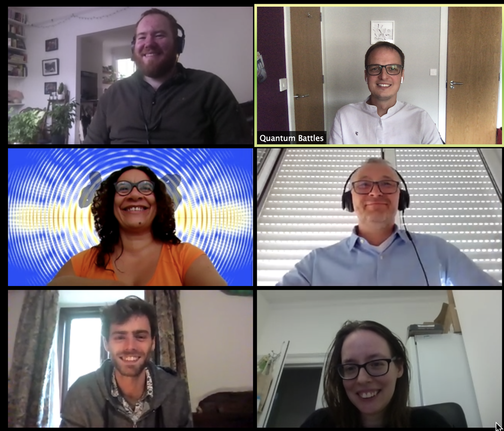Conference picture with a small sample of the conference participants. It was impossible to gather over 300 people from 35 countries at the same time.

From top to bottom (anticlockwise): Henry Bennie (UCL Quantum) and the key scientific organizers: Carla Faria, Andrew Maxwell, Bridgette Cooper, Sergey Yurchenko and Andrew Brown.
See also our articles in
|
STATEMENT FROM THE ORGANIZERS
We are starting the organization of the Quantum Battles in Attoscience 2023. It will take place at University College London from the 28th to the 30th of June. More info soon! Thank you so much for joining the virtual workshop Quantum Battles in Attoscience. We appreciate your support and have done our best to provide a sense of community in these difficult times. We had over 300 participants from 34 countries. We would like to thank the Photonics Online Meetup for inspiration and guidance in moving to this online format. Meanwhile, we wish you good health and may you and your loved ones be safe! Do not miss our sister seminar series, the Atto Fridays, the 2023 season will start soon
Organizers: Carla Faria, Lidice Cruz Rodriguez, Sufia Hashim and Thomas Rook (UCL)
|
Vision & AimsAttosecond science has emerged from the study of the interaction of matter with intense laser fields, and it is the natural successor of femtochemistry. Its main objective is to resolve and ultimately control electron dynamics in real time. Electrons play a key role in photosynthesis, destroy or modify molecules, and can be used for information processing in human-made devices. This wide range of applications and huge potential for attosecond imaging of matter has made it a hugely popular and expanding area. Unfortunately, this rapid growth has led to a vast, fragmented methodological landscape, with many conflicting views.
The present workshop is focused on the quantum aspects of attoscience. It aims at exploring areas of tension in a collegial and controlled way and at providing a debating platform for early career researchers and leaders in the field. |
Organizers
|
|
Sample questions & areas of tension
|
How quantum is atto?
|
The attoscience of solids
|
|
For large targets, electron-electron correlation plays a key role. There are however, no systematic studies of whether this correlation is classical, or quantum, and classical approaches are used to describe strongly correlated dynamics without much justification. However, correlated electron dynamics in strong fields may involve processes for which there may be no classical counterpart. Examples are an appropriate treatment of bound states, the continuum, excitation, relaxation and electron-hole migration.
Chirality, symmetry & tailored fields
Moving from an unstructured to a structured continuum and incorporating bound-state dynamics has led to myriad approaches, whose efficacy, interpretational power and validity range vary. Key questions related to analytic orbit-based approaches are how to incorporate sub-barrier corrections and Coulomb distortions consistently, account for excited states and electron recapture. For methods with complex trajectories, the presence and regularization of branch cuts and singularities has also been a contentious issue
|
...and other topics!
|






